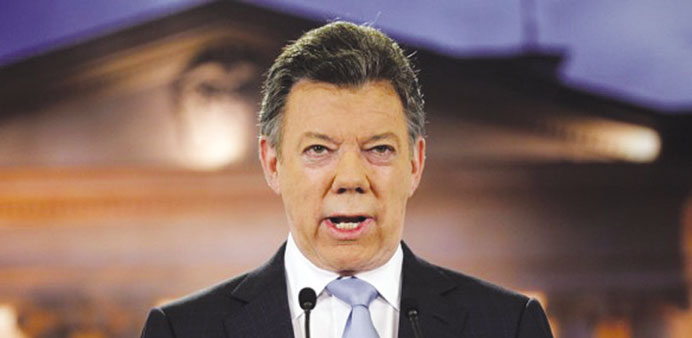Hopes of ending Colombia’s civil war, one of the longest-running and bloodiest conflicts in the world, will be dashed unless the Colombian government accepts genuine democratic and social reform, leaders of the Farc, the country’s main guerrilla group, have said.
Talks to settle the 50-year conflict between the government of Juan Manuel Santos, re-elected in June on a peace ticket, and the leftwing Revolutionary Armed Forces of Colombia - regarded as “narco-terrorists” by the US government - have already reached a series of agreements since they opened in Cuba in 2012.
But Farc leaders warned that the process risked breakdown if the US-backed Colombian government believed it could achieve the guerrillas’ surrender, refused to guarantee the rights and security of the opposition or continued to kill guerrilla commanders in the field.
Their concern at the direction of the negotiations was echoed this week by a cross-party group of Northern Ireland MPs and peace agreement veterans, who have held discussions with both sides and called for a bilateral ceasefire and a more open and even-handed process.
“They want peace for free, but that’s not going to happen,” senior Farc negotiator Marco Leon Calarca said. “A pantomime of peace won’t address the roots of the conflict. We are committed to peace and we’ve shown that through many gestures, including three unilateral ceasefires. We’re not looking for revolution at the negotiating table, but peace with social justice. We are a response to conflict, not its cause.
“We will not be the ones that break the talks,” Calarca insisted. “But they’re playing with fire when they try to eliminate our leaders with bombings. That could make us leave the table, because it would be clear they had no political will to reach agreement. It’s not as simple as we hand in our arms and we can enter politics - because they will kill us.”
President Santos used the same “playing with fire” phrase about the rebels this week when he blamed the Farc for an attack on an electricity tower in the paramilitary violence-wracked city of Buenaventura, which left hundreds of thousands without power. He said he would end the peace talks unless the guerrillas stopped “targeting civilians”.
The conflict in Colombia has claimed around 250,000 lives and forced over 5mn people from their homes.
The large majority of killings have been carried out by army, police and state-linked rightwing paramilitary groups. When the Farc last attempted to take part in electoral politics, several thousand members and elected officials were murdered. Large-scale human rights abuses have continued and in some cases increased despite the peace process, including the jailing and assassination of trade unionists, human rights and political activists.
Farc has gained notoriety for its involvement in the drugs trade - used to justify large-scale US backing for the Colombian military – it’s now mostly abandoned use of kidnapping, the recruitment of teenage soldiers and the killing of civilians.
The government has been upbeat about the peace talks, which follow a series of failed negotiations in the past. But the Farc team in Havana said although “a lot has been achieved, we’re not even a quarter of the way through the process”.
Fighting between the Colombian military and the 10,000-strong Farc guerrilla force has continued in rural areas throughout the negotiations.
The government insists the human rights situation is improving in the country and prosecutions of those responsible for extra-judicial killings have started to deliver convictions, but it will not negotiate either economic policy or military strategy.
Juanita Goebertus Estrada, of the government’s peace high commission, said a bilateral ceasefire was out of the question because the military and police “still need to protect civil society from a bunch of threats”.

